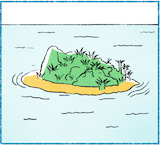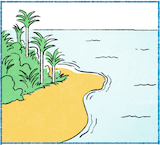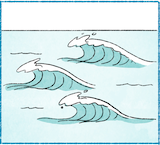


นี้คืออี่หยัง นี้คือเกาะ เป็นเกาะกางน้ำ หลือเกาะกางทะเลนั้นหละ
เป็นเกาะน้อยๆ เกาะบ่ใหญ่หลาย
อยู่ข้างๆ หลือลอบๆ เกาะนั้นเป็นอี่หยัง มันกะเป็นน้ำ เป็นน้ำทะเล เพาะว่าเกาะอันนี้มันอยู่กางทะเล เพาะสะนั้นแล้วอยู่ข้างๆ เกาะกะต้องเป็นน้ำทะเล
สีเหลียงๆ อยู่ข้างน้ำ หลือข้างทะเลนั้นเป็นอี่หยัง เป็นซายหาด สีเหลียงๆ อยู่นั้นเป็น[...] อยู่ข้างเกาะนั้นเป็นซายหาด เป็นซายหาดสีเหลียง
ขั้นเฮาสิไปเกาะแห่งนี้ หลือไปหม้องหม้องนี้ เฮาต้องไปจั่งใด กะมีวิทีเดียว เฮากะต้องขี่เลีย ขี่เลียเข้าไปเกาะอันนี้ เพาะว่าเฮาต้องข้ามน้ำข้ามทะเลนี้ไป เพื่อที่สิข้ามไปเกาะนี้ เฮากะต้องใซ้เลียลอยไป หลือขี่ไป เพื่อที่สิไปหม้องหม้องนี้นั้นหละ
9
สีเหลียงๆ ที่เฮาแนมเห็นนี้มันเป็นอี่หยัง มันเป็นซายหาด
เป็นซายหาดอยู่ข้างเกาะ หลืออยู่ข้างทะเลนั้นหละ เป็นซายหาด เป็นพื้นซายหาด พื้นดินซาย เป็นสีเหลียงๆ อยู่ข้างทะเล
ลักสะนะของซายหาดนี้เป็นจั่งใด ลักสะนะของซายหาดนี้กะเป็นค้ายๆ กับพื้นดินนั้นหละ แต่ว่ามันเป็นดินซาย บ่แม่นเป็นขี้ดินทัมมะดา เป็นขี้ดินซายที่อยู่ข้างๆ ทะเล อยู่ใก้กับทะเล หลือเอิ้นง่ายๆ ว่าเป็นซายหาดนั้นหละ
10
นี้คืออี่หยัง นี้เป็นคื้น เป็นคื้นน้ำ หลือเป็นคื้นทะเลนั้นหละ
คื้นทะเลกับคื้นน้ำนี้มันเกิดอยู่ใส กะเกิดอยู่ในน้ำ เกิดขึ้นอยู่ในทะเล
คื้นอันนี้มันตาย้านบ่ ตาย้านอยู่ ตาย้านหลาย ตาย้านคัก
ขั้นมันคื้นแฮงหลาย กะตาย้านหลาย แต่ว่าขั้นเป็นคื้นน้อยๆ มันกะบ่ตาย้าน
คื้นอันนี้เกิดมาจั่งใด กะเกิดมาจากน้ำ เกิดมาจากทะเลนั้นหละ เพาะว่ามีเลียหลือมีอี่หยังขี่อยู่กางทะเล หลือว่าเกิดจากลมนั้นหละ ลมพัดไปพัดมา หลือเลียแล่นไปแล่นมา กะเฮ็ดให้เป็นคื้น เฮ็ดให้เป็นคื้นน้ำคื้นทะเลนี้หละ
ส่วนมากคื้นใหญ่ๆ นี้สิเป็นญามมื้อคืน ญามมื้อเว็นสิบ่ค่อยมีคื้น สิมีอยู่ แต่ว่าคื้นบ่ใหญ่หลาย แต่ว่าขั้นญามมื้อคืนนี้ ญามดึกๆ ญามดืนๆ นี้ สิมีคื้น คื้นบักใหญ่ คื้นบักใหญ่บักคักหนึ่ง
Link to overview page
Link to dictionary
| Isaan | Pronunciation | Tones | Thai | English/Notes |
|---|---|---|---|---|
| นี้ | ni: | HF | นี้ | 1. this 2. here |
| คือ | khʉ: | HR | คือ | 1. to be, to resemble, like, as 2. why {บักหล้าคือบ่เก็บโต่ะแน่ = [addressing a young boy] Why haven't you cleared the table?} |
| อี่หยัง | i:-yaŋ | H-M | อะไร | 1. what {นี้คืออี่หยัง = What is this?} {มื้อนี้เจ้าเฮ็ดอี่หยัง = What are you doing today?} {กินเข้างายกับอี่หยัง = What did you have for breakfast?} 2. something, anything, (in negations) nothing {บ่ต้องเฮ็ดอี่หยังอีกเลยนอกจากใส่ปุย = [we] don't need to do anything besides adding fertilizer} |
| เกาะ | gɔ | M | เกาะ | 1. island 2. to stick to, to cling, to hold 3. elephant: to direct |
| เป็น | pen | M | เป็น | 1. to be, to exist 2. to be able to 3. to suffer, sth. happens to 4. เป็นหญัง[...]คือ in initial position: why? {เป็นหญังเขากะคือแปงฟัน = Why is he brushing his teeth?} {เป็นหญังเคี่ยงบินมันคือสิตก = Why is the airplane falling down?} |
| กาง | ga:ŋ | M | กลาง | middle, center |
| น้ำ | na:m | HF | น้ำ | 1. water 2. drink, soft drink, juice |
| หลือ | lʉ: | M | หรือ | or |
| ทะเล | tha-le: | H-HR | ทะเล | sea |
| นั้นหละ | nan-la | HF-M | นั่นแหละ | auxiliary for emphasis at the end of a phrase |
| น้อย | nɔ:i | HF | น้อย | 1. few, little 2. small |
| บ่ | bɔ: | H | ไม่ | 1. no, not 2. question particle, transforming a statement into a question Notes: spelling exception in line with common usage on social media |
| ใหญ่ | ɲai | H | ใหญ่ | large, big |
| หลาย | la:i | M | เยอะ, มาก | many, much, very |
| อยู่ | yu: | H | อยู่ | 1. to be (located) at 2. yet, still 3. auxiliary indicating continuous or progressive action {ทอดปาอยู่ในกะทะ = (in the process of) frying a fish in the pan} {แม่กำลังเมี้ยนเฮียนอยู่ = mother is cleaning/tidying up the house} |
| ข้าง | kha:ŋ | LF | ข้าง | 1. side {มีหูจับสองข้าง = there are handles on both sides} 2. next to {วางอยู่ข้างๆ ก่องใบใหญ่ = it's placed next to the large box} {เขายืนอยู่ข้างๆ อีกพุหนึ่ง = he's standing next to another person} 3. clf. for body parts which come in pairs (eyes, ears, legs etc.) {เขามีตาสองข้าง = she has two eyes} |
| ลอบ | lɔ:p | HF | รอบ | around |
| นั้น | nan | HF | นั้น | that, there |
| มัน | man | HR | มัน | it (also used to refer to people) |
| กะ | ga | M | ก็ | 1. then, consequently 2. also |
| เพาะว่า | phɔ-wa: | H-H | เพราะว่า | because |
| อัน | an | M | อัน | 1. thing, object 2. general clf. for objects |
| เพาะสะนั้นแล้ว | phɔ-sa-nan-lɛ:o | H-M-HF-HF | เพราะฉะนั้นแล้ว | therefore, for that reason, consequently Notes: pronunciation: also realized as เพาะฉะนั้น |
| ต้อง | tɔŋ | HF | ต้อง | to have to, must |
| สี | si: | M | สี | 1. color 2. colored pencil, crayon |
| เหลียง | li:aŋ | M | เหลือง | yellow |
| ซายหาด | sa:i-ha:t | HR-LF | ชายหาด | beach |
| ขั้น | khan | LF | เมื่อ | when, if |
| เฮา | hao | HR | เรา | 1. personal pronoun: we 2. personal pronoun: I |
| สิ | si | M | จะ | future tense auxiliary {เขากำลังสิตื่น = he's about to wake up} {สิไปตะหลาด = [I'm] going to the market} |
| ไป | pai | M | ไป | 1. to go 2. auxiliary indicating action extending into the future |
| แห่ง | hɛŋ | H | แห่ง | clf. for places {โลงเลียนแห่งนี้ = this school} {หม้องแห่งงาน = workplace} |
| หม้อง | mɔŋ | LF | ที่, แห่ง, บริเวณ | 1. place, area {หลายที่หลายหม้อง = in many places} {หม้องใดหม้องหนึ่ง = some place} 2. clf. for places |
| จั่งใด | jaŋ-dai | H-M | ยังไง, แบบไหน | how, in what manner {บักนาวมันมีลดซาดจั่งใด = Lime fruits have what kind of taste?} {เขาปิดแอจั่งใด = How is he switching off the A/C?} {เทียนใซ้จั่งใด = How's a candle used?} {สิใซ้จั่งใด = how is [it] used?} |
| มี | mi: | HR | มี | 1. to have 2. there is |
| วิที | wi-thi: | H-HR | วิธี | method, way, means |
| เดียว | di:ao | M | เดียว | only, alone, single |
| ขี่ | khi: | H | ขี่ | to ride, to drive {ขี่มอเตอไซ = to ride a motorbike} {ขี่ควย = to ride on a buffalo} {ขี่เลีย = to take or travel on a boat} |
| เลีย | li:a | HR | เรือ | boat Notes: pronunciation: also realized as เลือ |
| เข้า | khao | LF | เข้า | to enter, to go inside, to come/go in/on {เข้าห้องน้ำ = to go to the bathroom} {เข้านอน = to go to bed} {ขี่เลียเข้าไปเกาะ = to take a boat to go on an island} |
| ข้าม | kha:m | LF | ข้าม | to cross {ข้ามสะพาน = to cross a bridge} {ข้ามทะเล = to cross the sea} |
| เพื่อที่ | phʉ:a-thi: | H-H | เพื่อที่ | in order to, so that Notes: the vowel เอือ is likely to be a Thai loan |
| ใซ้ | sai | HF | ใช้ | to use |
| ลอย | lɔ:i | HR | ลอย | 1. to float, to swim 2. to soar 3. smoke/steam: to rise |
| ที่ | thi: | H | ที่ | 1. that, which {คนที่ยืนอยู่ฝั่งขวา = the person which is standing on the right = the person standing on the right} {เว้าคำที่บ่สุพาบ = to speak words which are impolite = to speak impolitely} 2. for ordinal numbers {ที่สาม = third} |
| แนม | nɛ:m | HR | มอง | to look, to glance, to stare {เขากำลังยืนแนมก้อนหินอยู่ = he's standing and looking at the stone/rock} {ข้างหนึ่งแนมเห็น อีกข้างหนึ่งแนมบ่เห็น = [we] see one side, [we] can't/don't see the other side} |
| เห็น | hen | M | เห็น | to see |
| พื้น | phʉ:n | HF | พื้น | 1. floor, ground 2. surface, area {หล่นลงไปลงพื้น = [it] falls to the ground} {เขานั่งอยู่เทิงพื้น = he's sitting on the floor} |
| พื้นดิน | phʉ:n-din | HF-M | พื้นดิน | ground, land, earth |
| ซาย | sa:i | HR | ทราย | sand |
| ลักสะนะ | lak-sa-na | H-M-H | ลักษณะ | feature, characteristic, quality |
| ของ | khɔ:ŋ | M | ของ | of, belonging to |
| ค้าย | kha:i | HF | คล้าย | to resemble, to be similar, to be alike {ทัพพีเป็นค้ายๆ กับซ้อน = a ladle is similar to a spoon} |
| กับ | gap | M | กับ | 1. and {ลุงกับป้า = uncle and aunt} {กวยเตียวหมูกับกวยเตียวไก่ = noodle soup with pork and noodle soup with chicken} 2. with, to {ค้ายๆ กับคำว่า ... = similar to the word ...} 3. prefix in front of foods {กับเข้า = side dishes eaten with rice} {เขากินกับกวยเตียว = he's eating noodle soup} |
| แต่ว่า | tɛ:-wa: | H-H | แต่ว่า | 1. but 2. only {ฮู้แต่ว่าเขายืนอยู่พุเดียว = I only know that he's standing there by himself} |
| ดิน | din | M | ดิน | earth, soil |
| บ่แม่น | bɔ:-mɛ:n | H-H | ไม่ใช่ | 1. not {เขาเป็นพุหญิง เขาบ่แม่นพุซาย = she's a woman, she's not a man} 2. no |
| ขี้ดิน | khi:-din | LF-M | ดิน | earth, soil |
| ทัมมะดา | tham-ma-da: | HR-H-M | ธรรมดา | normal, ordinary, common |
| ใก้ | gai | HF | ใกล้ | near, close |
| เอิ้น | ə:n | HF | พูด, เรียก | to call, to say {เอิ้นง่ายๆ ว่า = in other words} {คนอี่สานเอิ้นว่า เป็นลูกคนกก = Isaan people call her ลูกคนกก} |
| ง่าย | ŋa:i | H | ง่าย | easy, simple, clear |
| ว่า | wa: | H | ว่า | 1. that, as {คำว่า X = the word X} 2. to say |
| คื้น | khʉ:n | HF | คลื่น | wave |
| เกิด | gə:t | LF | เกิด | 1. (often together with ขึ้น) to happen, to arise, to take place {เกิดอี่หยังขึ้น = what is happening?} {บ่มีหญังเกิดขึ้น = nothing's happening} 2. to be born 3. to grow {หนวดกะคือสิเกิดอยู่ใต้ดัง = a moustache grows below the nose} |
| ใส | sai | M | (ที่)ไหน | 1. where? {สิไปใส = Where are [you] going?} {มาแต่ใส = Where are [you] coming from?} {กะทะอยู่ใส = Where's the pan?} 2. somewhere, anywhere {ใสกะได้ = anywhere, wherever you like} |
| ใน | nai | HR | ใน | in, within |
| ขึ้น | khʉn | LF | ขึ้น | 1. to go up, to increase 2. sun: to rise {ตะเว็นกำลังขึ้น = the sun is rising} 3. more 4. bus/train etc.: to get on, to board {พุโดยสานขึ้นลดไฟเบิดแล้ว = all passengers have boarded the train} |
| ตาย้าน | ta:-ya:n | M-HF | น่ากลัว | scary, not safe |
| คัก | khak | H | intensifier: very, very much | |
| แฮง | hɛ:ŋ | HR | แรง | 1. strong {ลมกำลังพัดแฮงอยู่ = to wind is blowing strongly} 2. loud {เสียงแฮง = loud} 3. strength, power |
| มา | ma: | HR | มา | 1. to come 2. auxiliary expressing action towards the present or focal time {กะคุเฮ็ดมาจากอี่หยัง = What is the bucket made of?} {แล้วเขากะเก็บเงินจากพุนั้นมา = and then she takes the money of that person} |
| จาก | ja:k | LF | จาก | 1. from {... เฮ็ดมาจากอี่หยัง = ... is made from what?} 2. to depart |
| ลม | lom | HR | ลม | wind |
| พัด | phat | H | พัด | to blow {ลมกำลังพัดอยู่ = the wind is blowing} {ลมพัดไปพัดมา = the wind is blowing back and forth} |
| แล่น | lɛ:n | H | วิ่ง | to run {ไก่กำลังแล่น = the chicken is running} {เด็กน้อยกะแล่นเหล้น = the kids are running around} {ลดไฟกำลังแล่น มันแล่นอยู่เทิงลาง = the train is running, it's running on rails} {เลียแล่นไปแล่นมา = ships are going back and forth} |
| เฮ็ด | het | H | ทำ | to do, to make |
| ให้ | hai | LF | ให้ | 1. to give {หมอกำลังเอายาให้คนป่วยกิน = the doctor is giving the patient medicine} 2. for 3. to allow, to be allowed |
| นี้หละ | ni:-la | HF-M | นี่แหละ | auxiliary for emphasis at the end of a phrase |
| ส่วนมาก | su:an-ma:k | H-HF | ส่วนมาก | mostly, usually, generally |
| ญาม | ɲa:m | HR | ยาม | 1. period of time {ญามมื้อเซ้า = morning} {ญามเที่ยง = noon} 2. when, while {ญามทอด ต้องใซ้น้ำมันพ้อม = one needs to use oil when frying} {ญามสิออกไปข้างนอกกะต้องใส่เกิบ = when one goes out, ones has to wear shoes} |
| มื้อคืน | mʉ:-khʉ:n | HF-HR | คืน | night |
| มื้อเว็น | mʉ:-wen | HF-HR | กลางวัน | day, daytime |
| บ่ค่อย | bɔ:-khɔ:i | H-H | ไม่ค่อย | not so (much) {เบิ่งบ่ค่อยออก = I can't really see it clearly} |
| ดึก | dʉk | M | ดึก | late at night |
| ดืน | dʉ:n | M | ดึก | late at night |
| บัก | bak | M | 1. intensifier before adjectives {ปาโตบักใหญ่ = a (very) large fish} 2. prefix in front of fruits and vegetables {บักแตงโม = watermelon} 3. can be used as a reference for a male person of the same or younger age {บักอันนี้ = this lad} |
|
| บักคักหนึ่ง | bak-khak-nʉŋ | M-H-H | intensifier: very, very much (variant of คัก) |